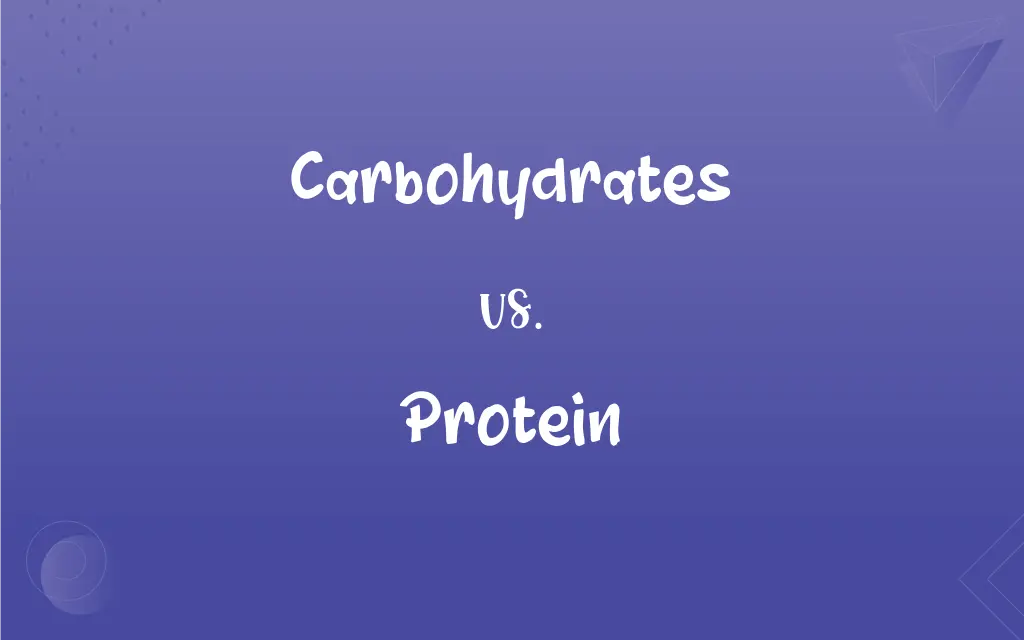Carbohydrates vs. Protein: What's the Difference?
Edited by Aimie Carlson || By Janet White || Published on January 2, 2024
Carbohydrates are organic compounds mainly used for energy, consisting of sugars and starches; proteins are complex molecules essential for growth and repair, made up of amino acids.

Key Differences
Carbohydrates, composed of carbon, hydrogen, and oxygen, are primarily used by the body as a source of energy. Proteins, made of amino acids, play a crucial role in building and repairing tissues, as well as in the functioning of enzymes and hormones.
The body breaks down carbohydrates into glucose, providing quick energy, particularly important for brain and muscle function. Proteins, on the other hand, are not primarily energy sources but are vital for growth, muscle repair, and the maintenance of body tissues.
Dietary sources of carbohydrates include grains, fruits, and vegetables, providing fiber, vitamins, and minerals. Protein-rich foods include meat, dairy, legumes, and nuts, which are essential for building muscle and producing enzymes.
Carbohydrates can be simple (sugars) or complex (starches and fiber), impacting how quickly they are digested and absorbed. Proteins are made up of 20 different amino acids, some of which are essential and must be obtained through diet.
Comparison Chart
Primary Function
Energy source
Growth, repair, and maintenance of tissues
ADVERTISEMENT
Composition
Carbon, hydrogen, oxygen
Amino acids
Dietary Sources
Grains, fruits, vegetables
Meat, dairy, legumes, nuts
Types
Simple (sugars) and complex (starches, fiber)
20 amino acids, essential and non-essential
Role in Body
Quick energy, especially for brain and muscles
Muscle building, enzyme production
Carbohydrates and Protein Definitions
Carbohydrates
Organic compounds that are a primary energy source for the body.
Bread is a common source of carbohydrates.
ADVERTISEMENT
Protein
Composed of chains of amino acids, essential for various bodily functions.
Beans are a great plant-based protein source.
Carbohydrates
Sugars, starches, and fibers found in fruits, grains, vegetables, and milk products.
Carbohydrates in fruits provide natural sugars.
Protein
A dietary requirement that varies based on age, sex, and activity level.
Athletes often have higher protein needs.
Carbohydrates
Nutrients that break down into glucose to fuel bodily functions.
Athletes consume carbohydrates for quick energy.
Protein
Essential molecules made up of amino acids, crucial for body repair and growth.
Chicken is a high-protein food.
Carbohydrates
The sugars, both simple and complex, forming a significant part of the human diet.
Pasta is rich in complex carbohydrates.
Protein
Proteins can be complete (with all essential amino acids) or incomplete.
Eggs are a source of complete protein.
Carbohydrates
A macronutrient that provides dietary fiber for digestive health.
Whole grains are a good source of fibrous carbohydrates.
Protein
A macronutrient that builds muscle, repairs tissue, and makes enzymes and hormones.
Protein shakes are popular post-workout.
Carbohydrates
Any of a group of organic compounds, including sugars, starches, celluloses, and gums, that contain only carbon, hydrogen, and oxygen and that originate chiefly as products of photosynthesis. Carbohydrates serve as a major energy source for living things.
Carbohydrates
A food, such as bread, rice, or potatoes, that is composed largely of these substances.
Carbohydrates
Plural of carbohydrate
FAQs
What are carbohydrates?
Organic compounds that provide energy, consisting of sugars and starches.
What's the primary role of carbohydrates in the body?
To provide quick energy, especially for brain and muscles.
What's the primary role of protein in the body?
To build and repair tissues, and for enzyme and hormone production.
Are carbohydrates essential nutrients?
Yes, they are essential for providing energy.
Can carbohydrates be stored in the body?
Yes, as glycogen in the liver and muscles.
What is protein?
A complex molecule made of amino acids, essential for growth and tissue repair.
Do carbohydrates have different types?
Yes, simple (sugars) and complex (starches and fiber).
What are amino acids in proteins?
Building blocks of proteins, essential for various body functions.
Are all proteins the same?
No, there are complete and incomplete proteins based on amino acid composition.
Can protein help in weight loss?
Yes, it can promote satiety and help in building muscle mass.
Do carbohydrates affect blood sugar?
Yes, especially simple carbohydrates can spike blood sugar levels.
Is it possible to have a protein deficiency?
Yes, especially in diets low in animal and dairy products.
Are proteins essential nutrients?
Yes, they are essential for various bodily functions.
What are sources of carbohydrates?
Grains, fruits, and vegetables are rich in carbohydrates.
What are good sources of protein?
Meat, dairy, legumes, and nuts are high in protein.
How much carbohydrates should one consume?
It depends on individual energy needs, but generally 45-65% of total calories.
How does the body use protein?
For muscle building, tissue repair, and producing enzymes.
Are there health risks associated with high carbohydrate intake?
Excessive intake can lead to weight gain and increased blood sugar levels.
How much protein is recommended daily?
It varies, but generally 0.8 grams per kilogram of body weight.
What is glycemic index in carbohydrates?
A measure of how quickly a carbohydrate food raises blood sugar.
About Author
Written by
Janet WhiteJanet White has been an esteemed writer and blogger for Difference Wiki. Holding a Master's degree in Science and Medical Journalism from the prestigious Boston University, she has consistently demonstrated her expertise and passion for her field. When she's not immersed in her work, Janet relishes her time exercising, delving into a good book, and cherishing moments with friends and family.
Edited by
Aimie CarlsonAimie Carlson, holding a master's degree in English literature, is a fervent English language enthusiast. She lends her writing talents to Difference Wiki, a prominent website that specializes in comparisons, offering readers insightful analyses that both captivate and inform.






































































